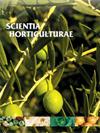茉莉酸甲酯可减轻石榴果皮褐变并调节石榴果实酚代谢相关基因的表达
IF 3.9
2区 农林科学
Q1 HORTICULTURE
引用次数: 0
摘要
石榴对低温敏感,易受冷害(CI),导致果皮褐变。研究了低温贮藏期间茉莉酸甲酯(MeJA)、热水处理(HWT)和对照处理对石榴果实品质的影响。结果表明,MeJA 和热水处理能有效抑制石榴果实褐变指数、色差、相对电导率、多酚氧化酶(PPO)和过氧化物酶(POD)活性、酚类物质维持量和苯丙氨酸氨化酶(PAL)活性的增加。第 70 天,MeJA 处理的褐变指数比对照组低 55.42%,相对电导率和 MDA 含量分别比对照组低 24.32% 和 51.67%。此外,MeJA 处理延缓了 PgPPO 和 PgPOD 基因表达水平的上升,上调了 PgPAL 基因的表达水平。总之,MeJA处理可提高抗氧化能力,通过调节酚代谢和基因表达水平缓解CI。本文章由计算机程序翻译,如有差异,请以英文原文为准。
Methyl jasmonate alleviates the husk browning and regulates expression of genes related to phenolic metabolism of pomegranate fruit
Pomegranate is sensitive to low temperature and is susceptible to chilling injury (CI), resulting in husk browning. The effects of Methyl jasmonate (MeJA), hot water treatment (HWT), and control treatments on the quality of pomegranate fruit during low temperature storage were investigated. The results showed that MeJA and HWT treatments could effectively inhibit the increase of browning index, color difference, relative conductivity, polyphenol oxidase (PPO) and peroxidase (POD) activities, maintain phenolic substances and the activity of phenylalanine ammonia-lyase (PAL). The browning index of MeJA treatment was 55.42 % lower than control treatment on the 70th day, the relative conductivity and MDA content were 24.32 % and 51.67 % lower than control treatment, respectively. Furthermore, MeJA treatment delayed the increase of PgPPO and PgPOD gene expression levels, upregulated the expression levels of PgPAL gene. Overall, MeJA treatment could improve antioxidant capacities, alleviate CI by regulating phenolic metabolism and gene expression levels.
求助全文
通过发布文献求助,成功后即可免费获取论文全文。
去求助
来源期刊

Scientia Horticulturae
农林科学-园艺
CiteScore
8.60
自引率
4.70%
发文量
796
审稿时长
47 days
期刊介绍:
Scientia Horticulturae is an international journal publishing research related to horticultural crops. Articles in the journal deal with open or protected production of vegetables, fruits, edible fungi and ornamentals under temperate, subtropical and tropical conditions. Papers in related areas (biochemistry, micropropagation, soil science, plant breeding, plant physiology, phytopathology, etc.) are considered, if they contain information of direct significance to horticulture. Papers on the technical aspects of horticulture (engineering, crop processing, storage, transport etc.) are accepted for publication only if they relate directly to the living product. In the case of plantation crops, those yielding a product that may be used fresh (e.g. tropical vegetables, citrus, bananas, and other fruits) will be considered, while those papers describing the processing of the product (e.g. rubber, tobacco, and quinine) will not. The scope of the journal includes all horticultural crops but does not include speciality crops such as, medicinal crops or forestry crops, such as bamboo. Basic molecular studies without any direct application in horticulture will not be considered for this journal.
 求助内容:
求助内容: 应助结果提醒方式:
应助结果提醒方式:


